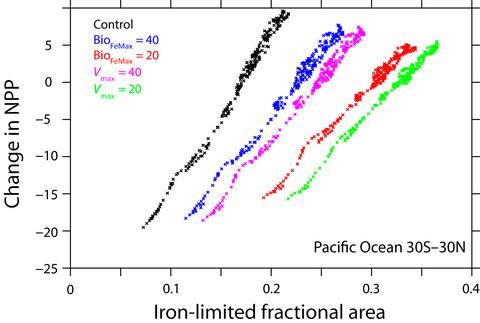当前位置:
X-MOL 学术
›
Glob. Change Biol.
›
论文详情
Our official English website, www.x-mol.net, welcomes your
feedback! (Note: you will need to create a separate account there.)
An iron cycle cascade governs the response of equatorial Pacific ecosystems to climate change.
Global Change Biology ( IF 10.8 ) Pub Date : 2020-09-24 , DOI: 10.1111/gcb.15316 Alessandro Tagliabue 1 , Nicolas Barrier 2 , Hubert Du Pontavice 3, 4 , Lester Kwiatkowski 5 , Olivier Aumont 5 , Laurent Bopp 6 , William W L Cheung 4 , Didier Gascuel 3 , Olivier Maury 2
Global Change Biology ( IF 10.8 ) Pub Date : 2020-09-24 , DOI: 10.1111/gcb.15316 Alessandro Tagliabue 1 , Nicolas Barrier 2 , Hubert Du Pontavice 3, 4 , Lester Kwiatkowski 5 , Olivier Aumont 5 , Laurent Bopp 6 , William W L Cheung 4 , Didier Gascuel 3 , Olivier Maury 2
Affiliation

|
Earth System Models project that global climate change will reduce ocean net primary production (NPP), upper trophic level biota biomass and potential fisheries catches in the future, especially in the eastern equatorial Pacific. However, projections from Earth System Models are undermined by poorly constrained assumptions regarding the biological cycling of iron, which is the main limiting resource for NPP over large parts of the ocean. In this study, we show that the climate change trends in NPP and the biomass of upper trophic levels are strongly affected by modifying assumptions associated with phytoplankton iron uptake. Using a suite of model experiments, we find 21st century climate change impacts on regional NPP range from −12.3% to +2.4% under a high emissions climate change scenario. This wide range arises from variations in the efficiency of iron retention in the upper ocean in the eastern equatorial Pacific across different scenarios of biological iron uptake, which affect the strength of regional iron limitation. Those scenarios where nitrogen limitation replaced iron limitation showed the largest projected NPP declines, while those where iron limitation was more resilient displayed little future change. All model scenarios have similar skill in reproducing past inter‐annual variations in regional ocean NPP, largely due to limited change in the historical period. Ultimately, projections of end of century upper trophic level biomass change are altered by 50%–80% across all plausible scenarios. Overall, we find that uncertainties in the biological iron cycle cascade through open ocean pelagic ecosystems, from plankton to fish, affecting their evolution under climate change. This highlights additional challenges to developing effective conservation and fisheries management policies under climate change.
中文翻译:

铁循环级联控制着赤道太平洋生态系统对气候变化的响应。
地球系统模型预测,全球气候变化将在未来减少海洋净初级生产(NPP),营养级别较高的生物群生物量和潜在的捕捞量,特别是在赤道东太平洋。但是,关于铁的生物循环的假设约束不严,破坏了地球系统模型的预测,而铁的生物循环是海洋大部分地区NPP的主要限制资源。在这项研究中,我们表明,修改浮游植物铁摄入量相关的假设会严重影响NPP的气候变化趋势和较高营养水平的生物量。通过一系列模型实验,我们发现在高排放气候变化情景下,21世纪气候变化对区域NPP的影响范围从-12.3%到+ 2.4%。这种广泛的变化是由于在不同的生物铁吸收情景下,赤道东太平洋上层海洋中铁的滞留效率变化而造成的,这影响了区域铁限制的强度。那些用氮限制代替铁限制的方案显示了最大的预计NPP下降,而那些铁限制更有弹性的方案显示的未来变化很小。所有模式情景在再现区域海洋NPP过去的年际变化方面都具有相似的技能,这在很大程度上是由于历史时期的有限变化。最终,在所有可能的情况下,本世纪末营养级生物量变化的预测都将改变50%至80%。总体而言,我们发现,生物铁循环中的不确定性通过开放的海洋中上层生态系统而级联,从浮游生物到鱼类,影响它们在气候变化下的进化。这凸显了在气候变化下制定有效的保护和渔业管理政策所面临的其他挑战。
更新日期:2020-10-19
中文翻译:

铁循环级联控制着赤道太平洋生态系统对气候变化的响应。
地球系统模型预测,全球气候变化将在未来减少海洋净初级生产(NPP),营养级别较高的生物群生物量和潜在的捕捞量,特别是在赤道东太平洋。但是,关于铁的生物循环的假设约束不严,破坏了地球系统模型的预测,而铁的生物循环是海洋大部分地区NPP的主要限制资源。在这项研究中,我们表明,修改浮游植物铁摄入量相关的假设会严重影响NPP的气候变化趋势和较高营养水平的生物量。通过一系列模型实验,我们发现在高排放气候变化情景下,21世纪气候变化对区域NPP的影响范围从-12.3%到+ 2.4%。这种广泛的变化是由于在不同的生物铁吸收情景下,赤道东太平洋上层海洋中铁的滞留效率变化而造成的,这影响了区域铁限制的强度。那些用氮限制代替铁限制的方案显示了最大的预计NPP下降,而那些铁限制更有弹性的方案显示的未来变化很小。所有模式情景在再现区域海洋NPP过去的年际变化方面都具有相似的技能,这在很大程度上是由于历史时期的有限变化。最终,在所有可能的情况下,本世纪末营养级生物量变化的预测都将改变50%至80%。总体而言,我们发现,生物铁循环中的不确定性通过开放的海洋中上层生态系统而级联,从浮游生物到鱼类,影响它们在气候变化下的进化。这凸显了在气候变化下制定有效的保护和渔业管理政策所面临的其他挑战。











































 京公网安备 11010802027423号
京公网安备 11010802027423号